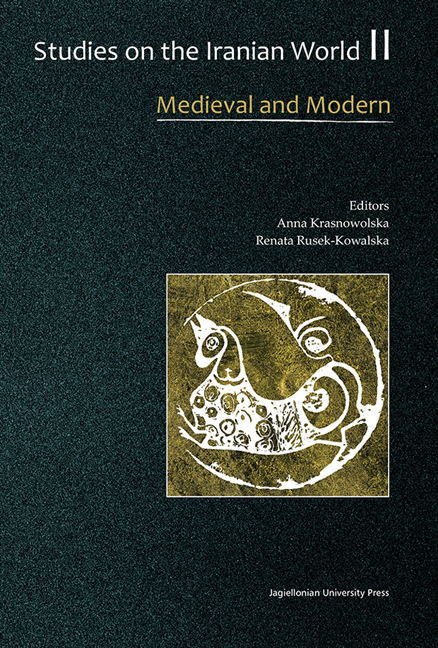Book contents
- Frontmatter
- Contents
- Foreword
- Linguistics
- Literature
- Religion
- History
- The Failure of the Constitutional Monarchy in Iran: The Socio- and Psycho-Genesis of Reza Khan's Rise to Power
- Concerning One Unpublished Persian Historical Document from Afshar Period
- Clash or Compromise? Mongol and Muslim Law in the Ilkhanate (1258–1335)
- New Insights on the Fiscal System of the Early Ilkhanids through the Analysis of al-Murshid fī al-Ḥisāb, an Unknown Accounting Manual
- Archaeological Survey of Kamar-e Marj Castle in Kermān Province
- Historians of their Time: Mongols, Mamluks and the Treatment of the Past
- Arts
- Social and Cultural Studies
Historians of their Time: Mongols, Mamluks and the Treatment of the Past
from History
Published online by Cambridge University Press: 12 January 2018
- Frontmatter
- Contents
- Foreword
- Linguistics
- Literature
- Religion
- History
- The Failure of the Constitutional Monarchy in Iran: The Socio- and Psycho-Genesis of Reza Khan's Rise to Power
- Concerning One Unpublished Persian Historical Document from Afshar Period
- Clash or Compromise? Mongol and Muslim Law in the Ilkhanate (1258–1335)
- New Insights on the Fiscal System of the Early Ilkhanids through the Analysis of al-Murshid fī al-Ḥisāb, an Unknown Accounting Manual
- Archaeological Survey of Kamar-e Marj Castle in Kermān Province
- Historians of their Time: Mongols, Mamluks and the Treatment of the Past
- Arts
- Social and Cultural Studies
Summary
SUMMARY
The article addresses the problem surrounding the reception of literary chronicles with regard to their historiographical value and the ongoing influence of this reception. Since the nineteenth century, literary chronicles have been regarded as less reliable than those written in a seemingly simpler style. In comparing two authors from Iran and from Egypt, Waṣṣāf and Ibn ad-Dawādārī, who have both been discredited because of their literary style, it becomes evident that both, although rooted in their local historiographical traditions, share a similar attitude to their work, namely, to combine seriousness of historical content with elegance of form.
It is a well known and undisputed fact that we can observe a high percentage of literary elements in the rich historiography of the thirteenth and fourteenth centuries.1 This also applies to Arabic and Persian sources. This insight has been accompanied ever since by the question whether the literary works of historiography written in this period are to be classified as history or literature, or as a combination of both, with decreasing reliability concerning the ‘hard facts’ of past events. Franz Rosenthal was convinced that the integration of literary devices into the hitherto ‘sober’ prose of historiography resulted in the genre's decline.2 This argumentation led to the assumption that more simply written works of historiography are to be regarded as more reliable than those developing a more ‘ornate’ style. This conclusion does not seem plausible.
We owe to Marilyn Waldman and Julie Scott Meisami the observation that the seemingly simple prose of the early period of historiographical writing is indeed composed with deliberately used rhetorical techniques. There can be no doubt that we are confronted with seriously composed historiography using literary elements as rhetorical and stylistic devices. If we follow the idea that not only ‘ornate style’ is composed rhetorically but also the more simple style in prose, we have to challenge the conclusion that a more literary style is a sign of unreliability, and simple prose of reliability. Obviously, the issue of the reliability of literary chronicles and/or historiographies did not occur at the time of their production. The problem seems to rest in a perception of historiography as being totally different from literature. This perception is a result of the nineteenth-century development of professional scholarship which even now has not lost its impact on scholarly assessments.
- Type
- Chapter
- Information
- Studies on the Iranian WorldMedieval and Modern, pp. 219 - 228Publisher: Jagiellonian University PressPrint publication year: 2015



